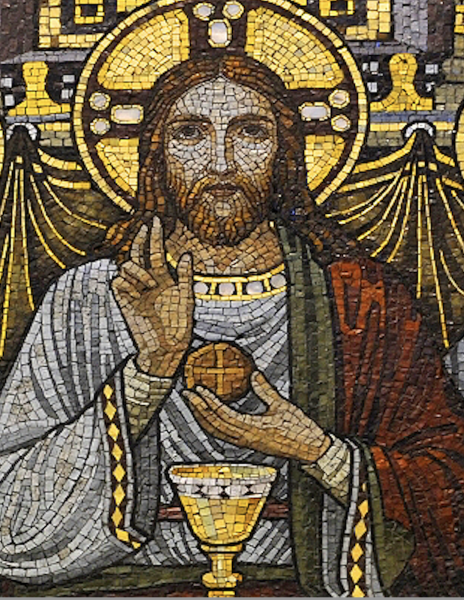The celebration of Corpus Christi each June always brings back for me fond memories of the liturgical theology courses I took as a grad student. I remember the brilliant and witty Fr. Frank Quinn, OP, who finally explained transubstantiation to me in a way that I could understand. In our course on Eucharist, he tracked the long history of Catholic inquiry concerning when in the Mass the bread and wine starts being the Body and Blood of Christ. Is it at the time of the epiclesis—the invocation of the Holy Spirit? Or is it the moment of consecration? Is this even something that we should worry about? Maybe. Maybe not. We know in the end that Jesus is present with us in the Eucharist.
But I also remember the sage Sr. Catherine Vincie, RSHM who in her courses often posed a different sort of question. I don’t know if she ever used these words exactly, but here is the gist: “When does it stop being the Body and Blood of Christ?” For lack of more poetic terms, how long after a person ingests the host and sips from the chalice does our reverence for Christ’s presence in our midst end? Every person who has been to the altar table of the Lord becomes a tabernacle. At what point do we get to stop treating each other with the same care we would expect for the Eucharistic elements? Two minutes? Once we hit the parking lot? Ever? Is this something we should worry about? A definite yes.
As I have watched the news of late, I’ve been thinking a lot about Sr. Catherine’s question. When do we get to stop reverencing our sisters and brothers in Christ as His Body and Blood? In what world is it okay for agents of the US government to yank fellow baptized brethren off the street and send them to foreign prisons or other extremely dangerous situations? Not any world I want to live in, and yet… Have we adequately found our voice as Catholics to name the sacrilege? To explicitly name that this kind of activity violates Catholic teaching, beginning with doctrine on the Eucharist?
At the service I attended for the feast of Corpus Christi (not my usual parish), the homily focused in good part on how we condemn ourselves if we participate in the sacrament unprepared, in a state of mortal sin. Not exactly the homily I would have preached. But it did get me thinking. Should we as American Catholics dare to approach the altar right now when such actions are being done in our name and we have not confessed our contribution to them—perhaps directly (Are there not Catholics in government decision-making roles, likely even in ICE itself?); perhaps indirectly by the way we’ve exercised our power to vote, or not vote, or by our silence, or by our lack of attention? Paul told the Corinthians that “those who eat and drink without discerning the body of Christ eat and drink judgment on themselves” (1 Cor. 11:29). Shall we be condemned for failing to “discern the Body of Christ” in our immigrant brethren?
In my work teaching conflict skills, I have spent a great deal of time with persons who are deeply committed to social justice and in so many cases I see them doing very difficult, discouraging work without much of a spiritual foundation. Many do not have a religious tradition that can feed them when times get tough and the road gets long. Many have a hard time tapping into a wider narrative and practice of communal worship that can give genuine hope and nurture resilience. Some have even become dismissive of religion, viewing it as inherently oppressive. That makes me sad because I think religion has a whole lot to offer. I myself couldn’t do what I try to do without it.
At the same time, in my work within the Church, I have spent much time with persons who are deeply inspired by the Church’s liturgy and feel very fed by the Eucharist. Yet, I meet a number who struggle to connect their commitment to worship with social justice. I meet some who even speak dismissively of the term "social justice." And that makes me sad, too. Because I think they might be missing the bigger picture. We partake of the Body and Blood of Christ, that we might become the Body and Blood of Christ in the world together. Any effort that tears apart the Body needs to be named explicitly as sin, and to the degree we are participating in it, beckons us to repent and act—not because we are “getting political” but as a matter of defending our faith in the Eucharist.
++++++
I’ll be in Chicago this week at a meeting of Catholic college and university presidents in collaboration with Interfaith America. Interfaith America is one of those groups that believes faith communities can play a vital role in making an America we all want to live in. I will be part of a three-day conversation around what healthy pluralism looks like (and does not look like) on Catholic campuses. How do you allow a true diversity of persons and beliefs to be honored while still staying firmly rooted within the Catholic tradition? Clearly, if we figure this out in three days we’ll have a miracle on our hands. But I am very excited about what I’ll learn being part of the conversation. Please keep this gathering in your prayers.
